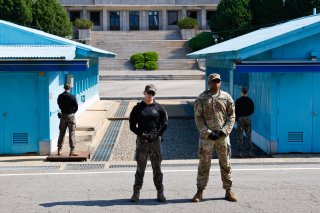Kamala Harris and North Korea: Can Anything Be Done?
Negotiations are unlikely to yield meaningful North Korean concessions, and as a result, neither a Harris nor Trump administration is likely to place much weight on the prospect.
Some problems don’t have solutions, and unfortunately, Korean denuclearization is one of them. A Kamala Harris presidency is unlikely to spend significant foreign policy capital on a North Korean gesture, which would be necessary for getting Kim Jong Un’s attention.
The reasons are many, including first and foremost the pressure on a new administration’s bandwidth from Ukraine, the Middle East, and efforts to squeeze out time for the China challenge. But the reasons are also local to the Northeast Asian neighborhood and grounded in domestic politics there. Kim Jong Un stewed for almost a year after the collapse of the Hanoi Summit, but he has now charted a course that will be difficult if not impossible to reverse. Missile testing can always be stopped, but the alignment with Russia and the decision to abandon unification with the South are more definitive ruptures with the past.
Domestic politics also plays a role in both the South and North. Under a center-left government in Seoul, the US faces more pressure to explore engagement options, such as Moon Jae-in’s persistent bid for an "end of war" declaration. Such pressures are likely to resurface following the South Korean election in 2027, but are weaker under the Yoon administration.
Less attention is given to domestic political imperatives in the North. The missile and nuclear programs are now deeply woven into the North Korean political DNA and have become a persistent theme of state propaganda. But as I have argued with TaiMing Cheung, the weapons programs also now reflect a complicated political economy. The nuclear-missile industrial complex encompasses significant swaths of the North Korean economy and employs elite scientists, engineers, and production workers. Where would they go were the programs to be seriously wound down?
The likely outcome for a Harris administration is Strategic Patience 2.0. Following the missile and nuclear tests of 2009, the Obama administration settled into a policy of offering—and actually pursuing—engagement, but with little hope that it would yield much. The Biden administration policy was surprisingly similar: offer negotiations without preconditions "any place, any time” but with minimal expectations they would take place. Rather, the focus was on strengthening the alliance, most notably through the founding of the Nuclear Consultative Group (NCG), trilateral cooperation with Japan, and marginal tweaks to the sanctions regime to raise North Korea’s procurement costs. That sounds like the most likely playbook for a Harris administration as well.
The strength of these headwinds can be seen if we consider whether Trump would do anything different. At the Republican National Convention (RNC), he sounded positively nostalgic about his dalliance with Kim Jong Un. But would he risk a replay of Singapore and Hanoi? I can see a scenario where the dance begins. Kim Jong Un sends a congratulatory message and Trump reciprocates. But then it gets down to the nitty-gritty: how one would actually get to a third summit. North Korea has been notoriously averse to negotiating the details of a nuclear deal. I see little reason that the present would be any different. The result: initial diplomatic feelers would flame out as a Trump administration recognizes that there is no political upside from a meeting.
In Short
Expect more of the same. Kim Jong Un will continue to provoke at levels that fall just below our need to coordinate a serious military response. The United States, Korea, and Japan will cooperate in maintaining the deterrent. But negotiations are unlikely to yield meaningful North Korean concessions, and as a result, neither a Harris nor Trump administration is likely to place much weight on the prospect.
About the Author:
Stephan Haggard is a Distinguished Research Professor at the School of Global Policy and Strategy, University of California San Diego. With Marcus Noland, he is the author of Famine in North Korea (2008), Witness to Transformation: Refugee Insights into North Korea (2011) and Hard Target: Sanctions, Inducements and the Case of North Korea (2018).
Image Credit: FOTO JOURNEY / Shutterstock.com

